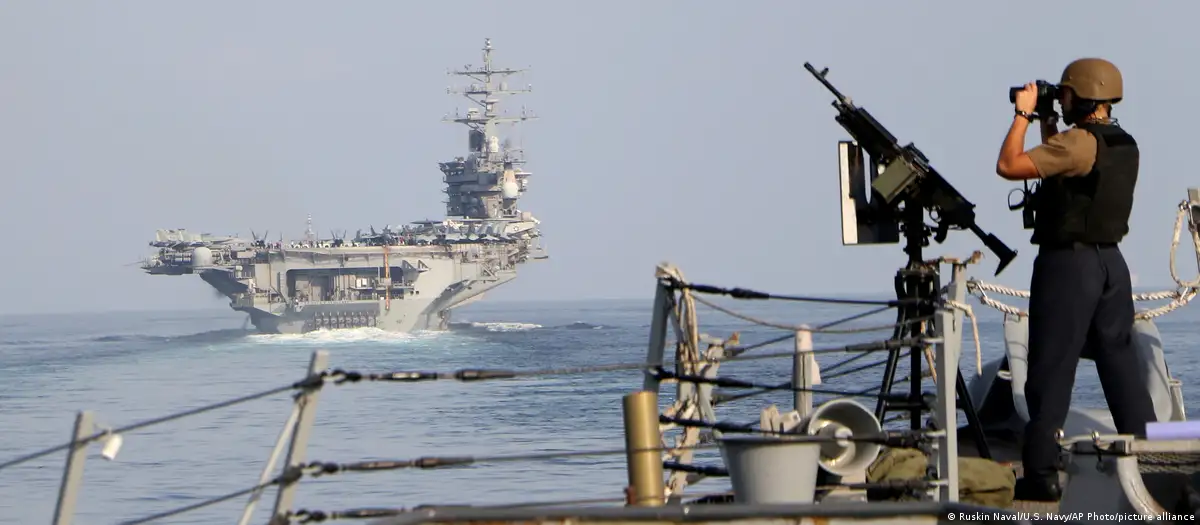Attacks on ships in the region are forcing freighters to reroute, driving up costs and disrupting supply chains and world trade.
(DW) Many of the global economic crises of recent years are connected to supply chains. Pandemic lockdowns, the war in Ukraine and the general rise in global inflation have all impacted or been affected by the flow of global trade and the countless moving parts that keep everything running.
Now, a new threat to global supply chains is emerging in the Red Sea. The world’s largest container shipping companies have halted their services in the area due to the growing number of attacks on ships by Iranian-backed Houthi rebels operating out of Yemen.
Any hope of a New Year’s truce was dashed on January 1, when Iran sent a warship into the Red Sea after the US Navy destroyed three Houthi boats there a day earlier.
The US says it sank the three boats “in self-defense” after Houthi ships fired on a Maersk container ship and then tried to board the vessel before the US attacked. The arrival of the Iranian warship is a sign of potential escalation in a crisis with potentially major implications for the global economy.
Oil prices rose by more than 2% on Tuesday (02/01), the first trading day after the attacks.
What’s going on?
Houthi rebels have been attacking ships in the Red Sea since November, claiming that they are acting in solidarity with the people of the Gaza Strip amid the Israeli bombardment of the enclave.
The attacks take place near the Bab al-Mandab strait, between Africa and the Arabian Peninsula. It is a critical waterway in global trade, through which just under a third of all global container ships pass daily.
Although the Houthis claim to be targeting ships linked to Israel, they have launched more than 100 drone and missile attacks against all types of ships sailing the route since November. The Maersk ship attacked on December 31 is registered in Singapore and operated by a Danish company.
The Houthis are a Shiite Islamist rebel group that has controlled large parts of western Yemen for most of the last decade. Strongly supported by Iran, they have been trying to overthrow the Yemeni government in the country’s ongoing civil war.
In response to the attacks, which have increased sharply in intensity and volume since mid-December, the US has set up a naval task force that includes the UK, France and other NATO countries, as well as regional allies such as Bahrain. Known as Operation Prosperity Guardian, its stated aim is to protect maritime transportation in the area.
Importance of the trade route
The Suez Canal is located at the northern tip of the Red Sea and connects the waterway to the Mediterranean Sea. This makes it by far the shortest naval route between Europe and Asia. Around 12% of all global maritime trade by volume travels through it. It is an especially important energy transit point, with around nine million barrels of oil passing through the canal every day.
The tense security situation has led companies such as Maersk, CMA CGM, Hapag-Lloyd and MSC to periodically halt operations in the area in recent weeks, causing delays and increasing costs.
Hapag-Lloyd is currently rerouting its ships through the Cape of Good Hope at the southern tip of South Africa. The company says it will do so until at least January 9. A Maersk spokesman said on Tuesday that the company was currently deciding whether or not to indefinitely halt its Red Sea shipping after the attacks and use the South Africa route.
The alternative route for ships traveling from Asia to Europe off the Cape of Good Hope adds about 3,500 nautical miles (6,482 kilometers) to a ship traveling to Europe from Singapore.
Taking this option generates higher fuel bills for carriers, while insurance premium costs have also risen in response to the crisis.
Global economic consequences
The risks to the global economy of an escalating conflict are significant. If the situation deteriorates further, freight shipping costs will continue to rise as more and more carriers opt for the Cape of Good Hope option. The price of oil would likely rise and the fragile recovery from high inflation would be threatened.
Another risk of escalation due to Iran’s direct involvement is if shipping in the Arabian Sea, south of Saudi Arabia and west of India, is also considered to be at risk of attack. Around a third of the world’s oil passes through these waters.
In addition, there is a risk of shipping delays. When the container ship Ever Given ran aground and blocked the Suez Canal for six days in the middle of the Covid-19 pandemic in 2021, it added further delays to an already fragile global trade system.
Shipping companies are still hopeful that the naval task force will quickly restore order and manage to prevent further attacks. There is also some confidence that global supply chains are more robust than they were at the time of the pandemic.
“Right now, we have an overcapacity of container ships. So in the worst case, if we have to keep going around Africa for a while, we have the container ships to do it,” Lars Jenson, CEO of Vespucci Maritime, a maritime industry consultancy based in Denmark, told DW last month.
However, global traders say the big risk is if the crisis continues to worsen and forces ships to take the longer route for a long time. This would also likely mean a potential widening of the Middle East conflict itself – a grim omen for the global economy in 2024.
*** Translated by DEFCONPress FYI Team ***
